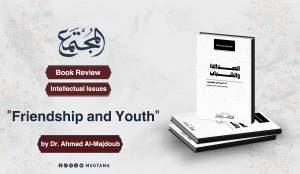Your Companions Shapes Your Reputation!
January 16, 2025
Life is a long journey filled with moments and challenges, and no one can walk this path alone. Friends are the companions along the way; they can either be a blessing that pushes you forward or a trial that burdens you. Therefore, it is essential to choose your friends wisely. In this article, we will explore five qualities that a true friend should possess:
- Reminds You of Allah
The best friend is the one who reminds you of Allah when you become distracted by the world. A friend who guides you back to the straight path, reminds you to pray, and encourages you to do good deeds is a rare treasure. Righteous companionship leads you to Paradise, not to negligence and sins. As the Prophet Muhammad (peace be upon him) said, “A man is upon the religion of his friend, so let one of you look at whom he befriends.” - Has Purpose, Priorities, and Strong Values
A true friend is someone with a clear vision for their life, a goal they strive to achieve, and a character built on principles and values. Such a friend will inspire you to be better, encouraging you to develop yourself and work toward your own goals. Avoid those who are frivolous and careless, without ambition or responsibility. - Stands By You in Good Times and Bad
Not everyone who smiles at you during happy times is a true friend. A genuine friend is the one who stands by your side in your darkest moments, offering support and assistance when you need it the most. If you find someone who doesn't abandon you in tough times, hold onto them, as they have proven their loyalty. - Gives You Honest Advice
A real friend is someone who speaks the truth to you, even if it’s difficult to hear. Their advice may be critical, but it stems from sincere love and concern for you. Beware of friends who flatter you at the expense of your best interests. An honest advisor seeks to correct your mistakes and guide you toward what is best for you. - Neither Envies You Nor Competes with You
Envy and jealousy are poisons that ruin relationships. The ideal friend is someone who celebrates your success as if it were their own and shares your dreams without feeling envious. Such a friend gives you emotional security and motivates you to achieve even more.
Friendship is not merely a passing relationship; it is a responsibility and a choice that shapes a significant part of your future. Befriend only those who embody these five qualities, for they will be your support in both this life and the Hereafter. Remember, a righteous friend is a blessing from Allah, so strive to be a good friend to those around you as well.
-------------------------------------------------------------
Book Review: “Friendship and Youth” by Dr. Ahmad Al-Majdoub
December 02, 2024The book Friendship and Youth offers a comprehensive overview of the value of friendship as a language that nurtures human relationships, enhances the tendency toward giving, and solidifies principles of loyalty, honesty, and integrity within society. This is especially crucial in light of economic transformations that have brought about profound and violent social changes, weakening the authentic values that long defined society.
The late Egyptian academic Dr. Ahmed Al-Magdoub, an expert at the National Center for Criminal and Social Research, warns against the materialistic changes that have overtaken society, which prioritize personal interest over collective welfare. This has led to deteriorated relationships and weakened social bonds.
The first chapter of the book, published in 2001 by the Egyptian Lebanese Publishing House, sheds light on the definition of friendship and distinguishes it from other forms of human relationships, such as collegiality, neighborliness, kinship, and other prevalent forms of interaction in human societies.
From a linguistic perspective, friendship (ṣadāqah) refers to companionship and derives from truthfulness and sincerity. According to Abu Hayyan Al-Tawhidi, the term "friend" (ṣadīq) stems from the word "truth" (ṣidq), and a true friend must embody honesty. In essence, friendship is a necessary social relationship founded on truth in every aspect.
The book, spanning 115 pages, delves into distinctions between various types of relationships: a friend versus a companion, an acquaintance versus a confidant, and friendship versus other associations like collegiality.
The second chapter explores the relationship between friendship, love, and passion, focusing on friendships between boys and girls. It critiques the progressive and enlightenment advocates who promote such relationships as essential for women's rights and gender equality. Dr. Al-Magdoub highlights the catastrophic consequences of these ideas, including the spread of fornication, immorality, and sexual violence in societies that blur the boundaries between genders and neglect ethical principles governing their interactions.
He poses the question: What do illegitimate pregnancies, abortions, and illegitimate children result from if not these friendships? He further questions why women often fail to be true friends to their husbands, suggesting that if they could succeed in this, divorce rates would decline significantly, and families would live in greater peace and happiness.
The third chapter examines the characteristics of friendship, such as mutual reliance and spontaneous reciprocity. Friendship allows individuals to share almost all aspects of their lives transparently and sincerely, engage in joint activities, and arouse strong emotions in each other. It fosters support, the exchange of ideas and perspectives, and mutual benefits, especially in long-standing friendships.
Dr. Al-Magdoub identifies the prerequisites for genuine friendship: shared environment, common goals, mutual interests, geographical proximity, and awareness.
In the fourth chapter, titled "How to Choose a Friend," the book discusses the opinions of both supporters and critics of friendship, the qualities to seek in potential friends, and the colloquial labels young people use for others, such as "boring" or "awkward." He underscores the importance of experience in choosing friends, the family’s role in nurturing children toward friendship, and how to select good friends while understanding their rights and duties.
The book outlines the social benefits of friendship, such as acquiring new skills, improving interpersonal relations, receiving both material and emotional support, and strengthening communal bonds. Psychologically, friendship helps reduce stress, combat isolation, alleviate frustration and depression, and encourage self-expression and positive emotions like joy and relaxation.
The fifth chapter focuses on the qualities one should seek in a friend, referencing classifications by notable scholars. Al-Tawhidi distinguished between virtuous and harmful friendships, while Ibn Miskawayh divided friendships into those of pleasure, utility, and virtue. Imam Al-Ghazali outlined five traits of a good friend: intelligence, good character, righteousness, generosity, and truthfulness. Similarly, Abu Najib Al-Suhrawardi stressed agreement in faith and ethics.
In conclusion, Dr. Al-Magdoub warns against bad friends, including those with weak character, those who mimic women, or those who imitate Western values, emphasizing that such friendships can lead to harm rather than benefit and virtue.
-------------------------------------------------------------



